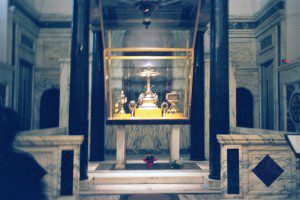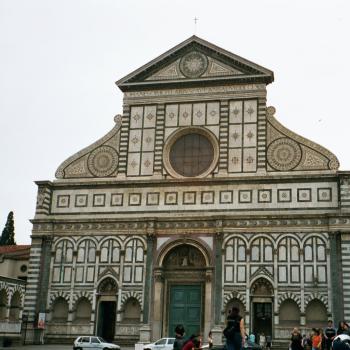Who we as a person comes in part from our choices, from our actions, from the freedom God has given to us to shape our identity. We are able to write biographies because of this, for through the deeds someone has done, we know a little of the person behind the deeds.[1] We must of course realize that our freedom is a limited, contingent form of freedom. There are many things given over to us which are outside of our control, such as the place and time of our birth. They set the stage for us in which we can act.
One such foundation which we cannot get around is the person God intends us to be in our union with Christ. Although it might sound a bit cliché, God has intentions for everyone, that is, he has a purpose for everyone, a purpose which can be said to be the mission they are meant to achieve in their life. This mission is outside of our control; we cannot make it for ourselves, as Hans Urs von Balthasar said:
No one can give himself a mission. On the other hand, where a person is entrusted with a substantial mission that summons him to put his very existence at its disposal, the person thus sent [der Gesendete] can, as a result, become (to a degree) identified with the mission [Sendung]. [2]
Because God has granted us a form of free will, we have some freedom in the way we execute the mission and fulfill it, or, if we want, to deny it. Our fulfillment of that mission allows us to truly become a person in Christ, while its utter rejection depersonalizes us, so that the more we realize our mission, the more we can be said to be a truly free subject, while the more we fight against it, the less of a subject we become, until at last, we lose all freedom as we lose our face before God.
The saints are those who let the mission God has given them truly define them. That is, a saint is someone who gives themselves and their lives entirely over the fulfillment of their mission, and in the process, their sins do not get in the way so that by the time they have died, they achieved at least the bare minimum required by God for their mission to be said to be fulfilled. Because of the way they are free to choose how they realize their mission, they clearly make mistakes in its execution. Saints also are sinners who stumble along the path to God like the rest of us, and so even in the fulfillment of their mission, they can and likely will have many grave errors in its execution. Grace, however, perfects nature, and those who give themselves over to God in love, and seek to follow him in faith, will find that his grace will be able to take the mess they made of their mission and still allow it to be fulfilled. Thus, when we look to the lives of the saints, we find them to be all too human, with human faults, often acting in ways we disapprove. Their holiness affirms not their errors, but their person in Christ, and the mission which they fulfilled through grace.
![By File:Hagia_Sophia_Southwestern_entrance_mosaics.jpg: Photograph: Myrabella derivative work: Myrabella [Public domain or CC0], via Wikimedia Commons](https://wp-media.patheos.com/blogs/sites/637/2016/05/Constantine_I_Hagia_Sophia-294x300.jpg)
St. Constantine had a very particular mission. He was called to have Rome conquered by the power and sign of the cross. That is, he was called to transform Rome, and with Rome, the world, to take in the implications of the incarnation in history and use them for the creation of a better society. He was in the middle of a military campaign, we are told, when he started to pray to God, asking for God’s help. He was then given a revelation of his mission, where he is said to have seen the sign of the cross in the heaven and told by it he shall conquer his enemies:
Accordingly he called on him with earnest prayer and supplications that he would reveal to him who he was, and stretch forth his right hand to help him in his present difficulties. And while he was thus praying with fervent entreaty, a most marvelous sign appeared to him from heaven, the account of which it might have been hard to believe had it been related by any other person. But since the victorious emperor himself long afterwards declared it to the writer of this history, when he was honored with his acquaintance and society, and confirmed his statement by an oath, who could hesitate to accredit the relation, especially since the testimony of after-time has established its truth? He said that about noon, when the day was already beginning to decline, he saw with his own eyes the trophy of a cross of light in the heavens, above the sun, and bearing the inscription, Conquer by this . At this sight he himself was struck with amazement, and his whole army also, which followed him on this expedition, and witnessed the miracle. [5]
Even with that revelation, he was not too sure what it meant until he later, through a dream, found the command was given to him again.[6] For this reason, some historians talk about the sign in the heavens, while others talked about the sign he received in his dream, such as we find in the writings of Lactantius:
Constantine was directed in a dream to cause the heavenly sign to be delineated on the shields of his soldiers, and so to proceed to battle. He did as he had been commanded, and he marked on their shields the letter Χ, with a perpendicular line drawn through it and turned round thus at the top, being the cipher of CHRIST. Having this sign, his troops stood to arms. The enemies advanced, but without their emperor they crossed the bridge. The armies met, and fought with the utmost exertions of valour, and firmly maintained their ground. In the meantime, a sedition arose at Rome, and Maxentius was reviled as one who had abandoned all concern for the safety of the commonweal; and suddenly, while he exhibited the Circensian games on the anniversary of his reign, the people cried with one voice, “Constantine cannot be overcome!” Dismayed at this, Maxentius burst from the assembly, and having called some senators together, ordered the Sibylline books to be searched. In them it was found that:—
“On the same day the enemy of the Romans should perish.”
Led by this response to the hopes of victory, he went to the field. The bridge in his rear was broken down. At sight of that the battle grew hotter. The hand of the Lord prevailed, and the forces of Maxentius were routed. He fled towards the broken bridge; but the multitude pressing on him, he was driven headlong into the Tiber.[7]
Constantine made the sign of the cross as the sign under which he would live out the rest of his life. After his victory in war, he made his new faith known, and asked for Christian authorities to come to him and help him understand his new faith better. Through Constantine, Christ was beginning to conquer the true enemies of the Romans, the dark powers which had come to rule over and direct the path of the Roman empire. Constantine gave authority, power and respect to the Christians and their churches, transforming Roman law through the guidance of the same Christians who had for so long been persecuted by the Roman state. Aided by his mother, he would literally set high up the cross, to make it a true sign of victory – the victory of the persecuted and abused over their abusers. Rome and the world would never be the same because he took the sign of the cross seriously, and he set forth with a desire to rule in a new way, to be led by the moral standards of his newfound faith. And despite how imperfectly he can be shown to live out those new standards, often not understanding their full implications, the change which took place in him and in Rome demonstrates the way his mission was lived out and fulfilled. By the time he died, though the battles between old Rome and the new Christian Rome were not yet over, the war was won, and no matter how some like Julian would like to go back to pre-Christian times, it was not possible. Constantine had changed the world as God had intended. There was no going back.[8]
This, then, is exemplified in the Troparion for his feast, where his mission is understood, and his glory in Christ praised:
Having seen the figure of the Cross in the heavens,
And like Paul not having received his call from men, O Lord,
Your apostle among rulers, the Emperor Constantine,
Has been set by Your hand as ruler over the Imperial City
That he preserved in peace for many years,
Through the prayers of the Theotokos, O only lover of mankind.

The feast of St. Constantine therefore is a feast of the cross, of the victory of life over death, of love over hate, of grace over sin. Constantine served the mission given to him in many ways, key of which, was to call the Church itself to needful self-reflection, through the calling of the first ecumenical council, Nicea. Christians during the times of persecution were not able to come together and reason out their faith together, but thanks to Constantine, a new era of intra-ecclesial relations formed, starting the path by which the Church could better present itself and its teachings to all. But of course, Constantine was not able to oversee what was to come after his death; his mission was to start the needful changes in society; after him, God would send others, with missions of their own, to continue that work, a work which continues to be with us to this day. Constantine fulfilled his mission and so justly is honored as a saint, despite whatever criticism can be rightfully pointed his way. Let us hope that we, too, can find our mission and fulfill it for the glory of God as well.
[1] This is also a foundation by which we can come to know God, that is, through his activities (energia) which we can comprehend.
[2] Hans Urs von Balthasar, Theo-Drama III. trans. Graham Harrison (San Francisco: Ignatius Press, 1992), 154.
[3] While the Western calendar ignores his feast, in the East, St. Constantine and his mother, St. Helen, are both celebrated on May the 21st. He is recognized as a saint by Eastern Catholics, and so through them, he is a Saint in the Catholic Church.
[4] The historian Sozomen believed that many things said against Constantine were questionable rumors made by his non-Christian subjects who sought to undermine his legacy through such gossip:
I am aware that it is reported by the pagans that Constantine, after slaying some of his nearest relations, and particularly after assenting to the murder of his own son Crispus, repented of his evil deeds, and inquired of Sopater, the philosopher, who was then master of the school of Plotinus, concerning the means of purification from guilt. The philosopher— so the story goes— replied that such moral defilement could admit of no purification. The emperor was grieved at this repulse, but happening to meet with some bishops who told him that he would be cleansed from sin, on repentance and on submitting to baptism, he was delighted with their representations, and admired their doctrines, and became a Christian, and led his subjects to the same faith. It appears to me that this story was the invention of persons who desired to vilify the Christian religion. Crispus, on whose account, it is said, Constantine required purification, did not die till the twentieth year of his father’s reign; he held the second place in the empire and bore the name of Cæsar and many laws, framed with his sanction in favor of Christianity, are still extant. That this was the case can be proved by referring to the dates affixed to these laws, and to the lists of the legislators. It does not appear likely that Sopater had any intercourse with Constantine whose government was then centered in the regions near the ocean and the Rhine; for his dispute with Maxentius, the governor of Italy, had created so much dissension in the Roman dominions, that it was then no easy matter to dwell in Gaul, in Britain, or in the neighboring countries, in which it is universally admitted Constantine embraced the religion of the Christians, previous to his war with Maxentius, and prior to his return to Rome and Italy: and this is evidenced by the dates of the laws which he enacted in favor of religion. But even granting that Sopater chanced to meet the emperor, or that he had epistolary correspondence with him, it cannot be imagined the philosopher was ignorant that Hercules, the son of Alcmena, obtained purification at Athens by the celebration of the mysteries of Ceres after the murder of his children, and of Iphitus, his guest and friend. That the Greeks held that purification from guilt of this nature could be obtained, is obvious from the instance I have just alleged, and he is a false calumniator who represents that Sopater taught the contrary.
Sozomen, Ecclesiastical History in NPNF2(2):242-3.
While this could be true for some things he is claimed to have done, we do know that at other times, he truly did act unjustly, such as in his treatment of St. Athanasius. We can object to many things he did, as we do with any saint, without rejecting the fact that they did fulfill their mission in life thanks to the grace of God.
[5] Eusebius, “The Life of Constantine” in NPNF2(1):490.
[6] See ibid., 490.
[7] Lactantius, “On the Manner in Which the Persecutors Died” in ANF(7): 318.
[8] This can be seen even in the way the pagans in Rome adapted themselves to imitate Christian ways, such as the way Julian tried to have Christian forms of charity copied by his pagan associates. Christ, and the imprint of Christ on Roman society after Constantine, made it impossible for thing to return to the way they were. Julian, moreover, found out that he could not turn back the change, so that when he died, he himself had to relent and admit Christ was victorious – the pagan past was over and any immediate attempt at its revival died with Julian.
Stay in touch! Like A Little Bit of Nothing on Facebook:
A Little Bit of Nothing










